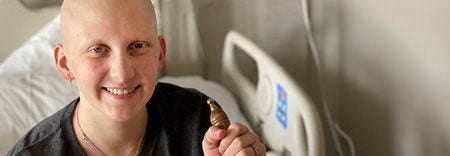Benefits of Quitting Tobacco If You Have Cancer
There are many benefits of quitting tobacco after you’ve been told you have cancer. Quitting can lead to longer survival and a better quality of life. Tobacco use can also worsen the side effects of some cancer treatments.
Benefits of quitting tobacco
If you quit tobacco, you might have:
- Better response to your cancer treatment
- Fewer and less-serious side effects from treatment
- Faster recovery from treatment
- Lower risk of infection
- Easier breathing
- More energy
You will also be less likely to get a second cancer in the future.
Risks of continuing to use tobacco
There are risks if you continue using tobacco after finding out you have cancer. If you keep using tobacco, you are at greater risk of:
- Worse side effects from surgery, such as heart and lung problems and a slower recovery
- Worse side effects from chemotherapy, such as infection, fatigue, heart and lung problems, and weight loss
- Worse side effects from radiation therapy, such as mouth sores, loss of taste, worse voice quality, and bone and soft tissue problems
- Your cancer coming back after treatment
- Other serious illnesses caused by tobacco use, such as heart and lung diseases or a second cancer
Myths about quitting tobacco
Here are some of the most common myths about quitting tobacco when you have cancer.
Myth: There is no point in quitting smoking now that I have cancer.
Fact: It’s never too late to quit smoking.
People who quit smoking after a cancer diagnosis have many benefits that people who continue to smoke don’t:
- Longer life
- A better chance of successful treatment
- Fewer side effects from treatment
- Faster recovery
- Better quality of life
Myth: Quitting smoking is too stressful for people getting treated for cancer.
Fact: The benefits outweigh the challenges.
Nicotine addiction is hard to break. And you may find the withdrawal process tough. But the benefits of quitting tobacco outweigh the challenges. Ask your doctor or cancer care team about how to best quit and manage your symptoms.
Myth: People can quit by themselves. They don't need help from a health care professional.
Fact: Support increases your chances of quitting.
Many people can and do quit by themselves. But you can increase your chances of quitting with the help of your health care team. They can offer support, information, and medication to help you quit for good.
Myth: Most medications used to quit smoking don’t work.
Fact: There are prescription medicines that have been shown to help people quit tobacco.
Many studies show that several medications can lower nicotine withdrawal symptoms and increase your chances of quitting. Your health care team can recommend the right medicine for you.
- Written by
- References

Developed by the American Cancer Society medical and editorial content team with medical review and contribution by the American Society of Clinical Oncology (ASCO).
This content has been developed by the American Cancer Society in collaboration with the Smoking Cessation Leadership Center to help people who want to learn about quitting tobacco.
American Society of Clinical Oncology. Benefits of Quitting Tobacco. Cancer.net. Content is no longer available.
National Cancer Institute. Harms of Cigarette Smoking and Health Benefits of Quitting. Accessed at https://www.cancer.gov/about-cancer/causes-prevention/risk/tobacco/cessation-fact-sheet on October 8, 2024.
National Comprehensive Cancer Network (NCCN). NCCN Clinical Practice Guidelines in Oncology: Smoking Cessation. Version 1.2024. Accessed at https://www.nccn.org/ on October 8, 2024.
US Centers for Disease Control and Prevention. Health Effects of Cigarettes: Cancer. Accessed at https://www.cdc.gov/tobacco/about/cigarettes-and-cancer.html on October 8, 2024.
Last Revised: October 28, 2024
American Cancer Society medical information is copyrighted material. For reprint requests, please see our Content Usage Policy.
American Cancer Society Emails
Sign up to stay up-to-date with news, valuable information, and ways to get involved with the American Cancer Society.



